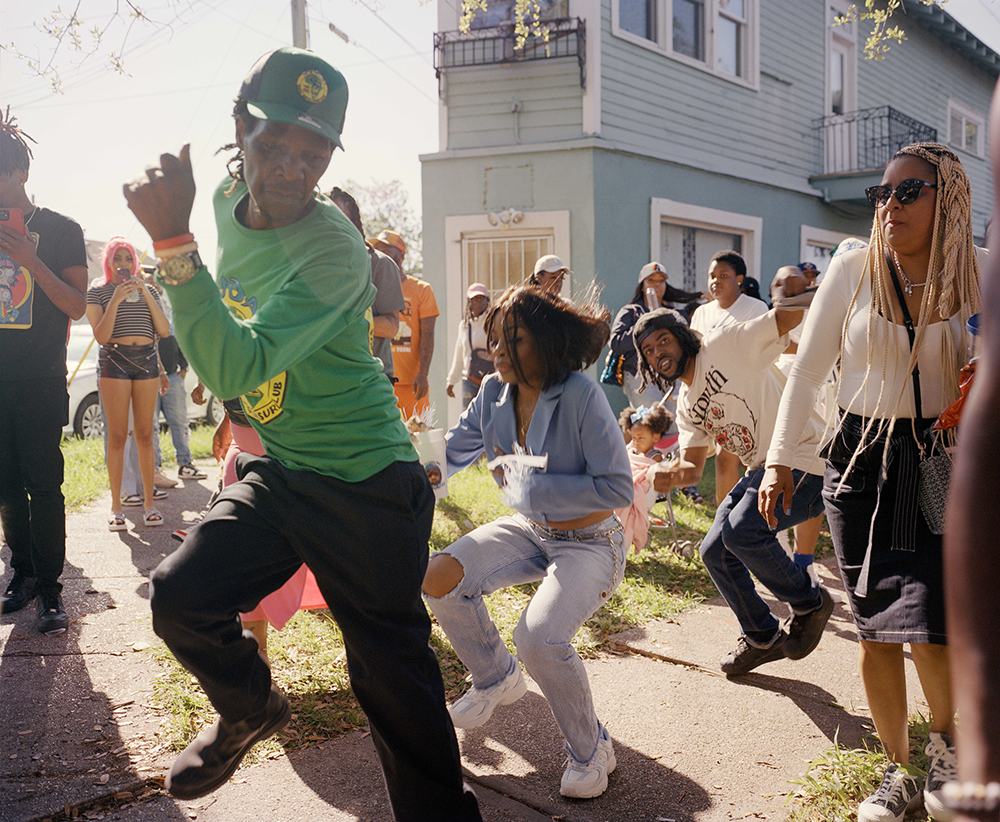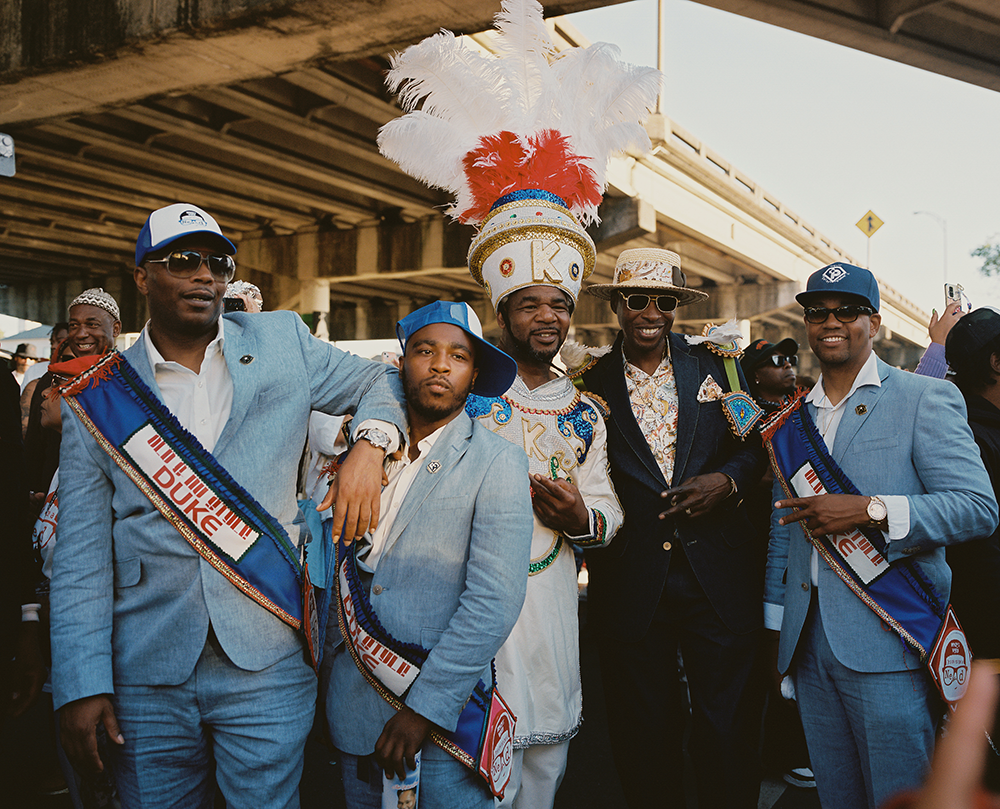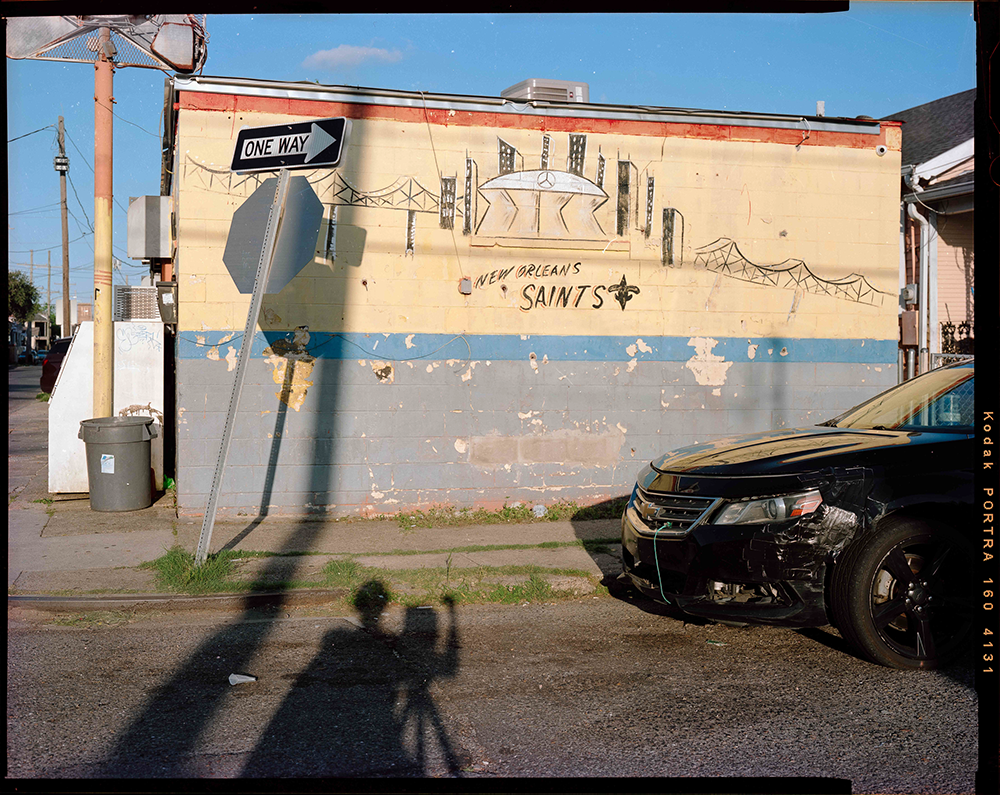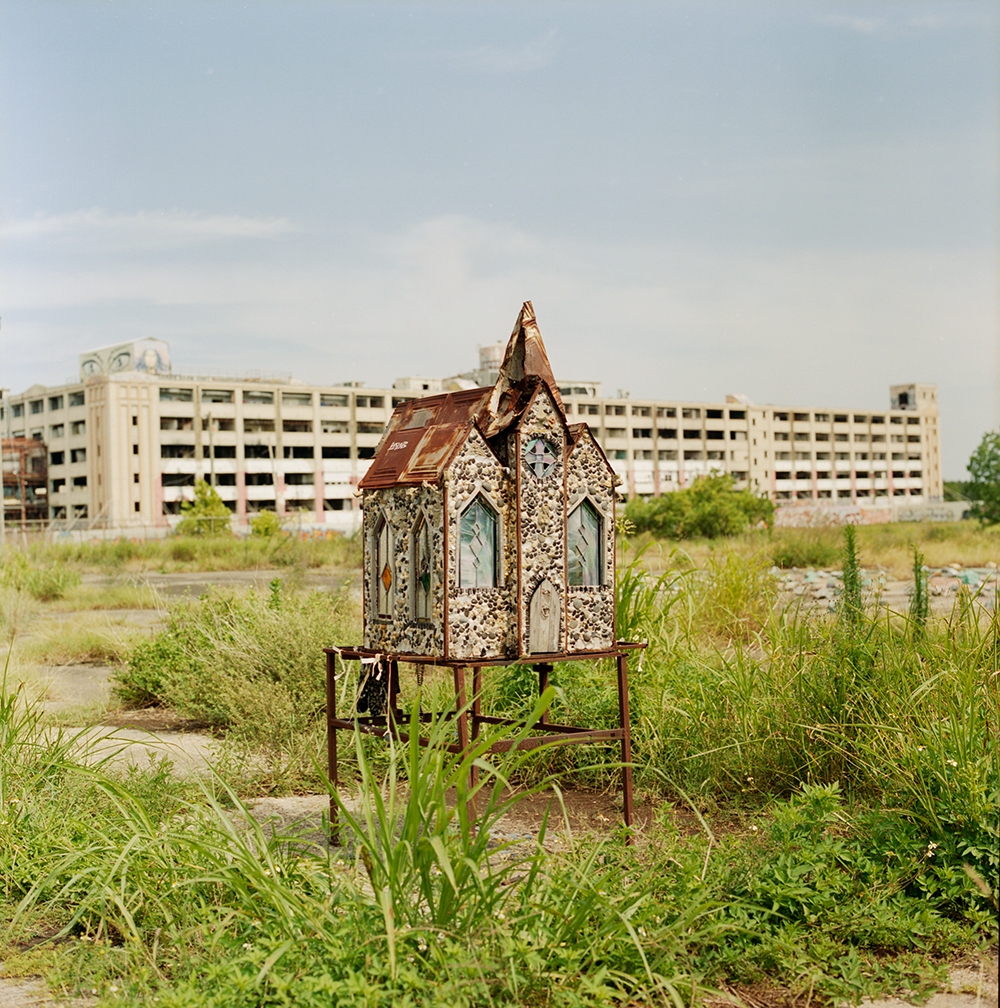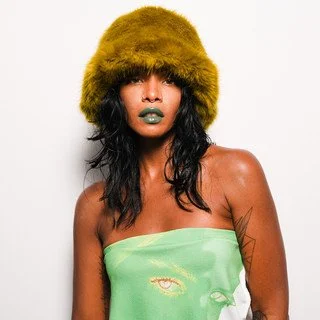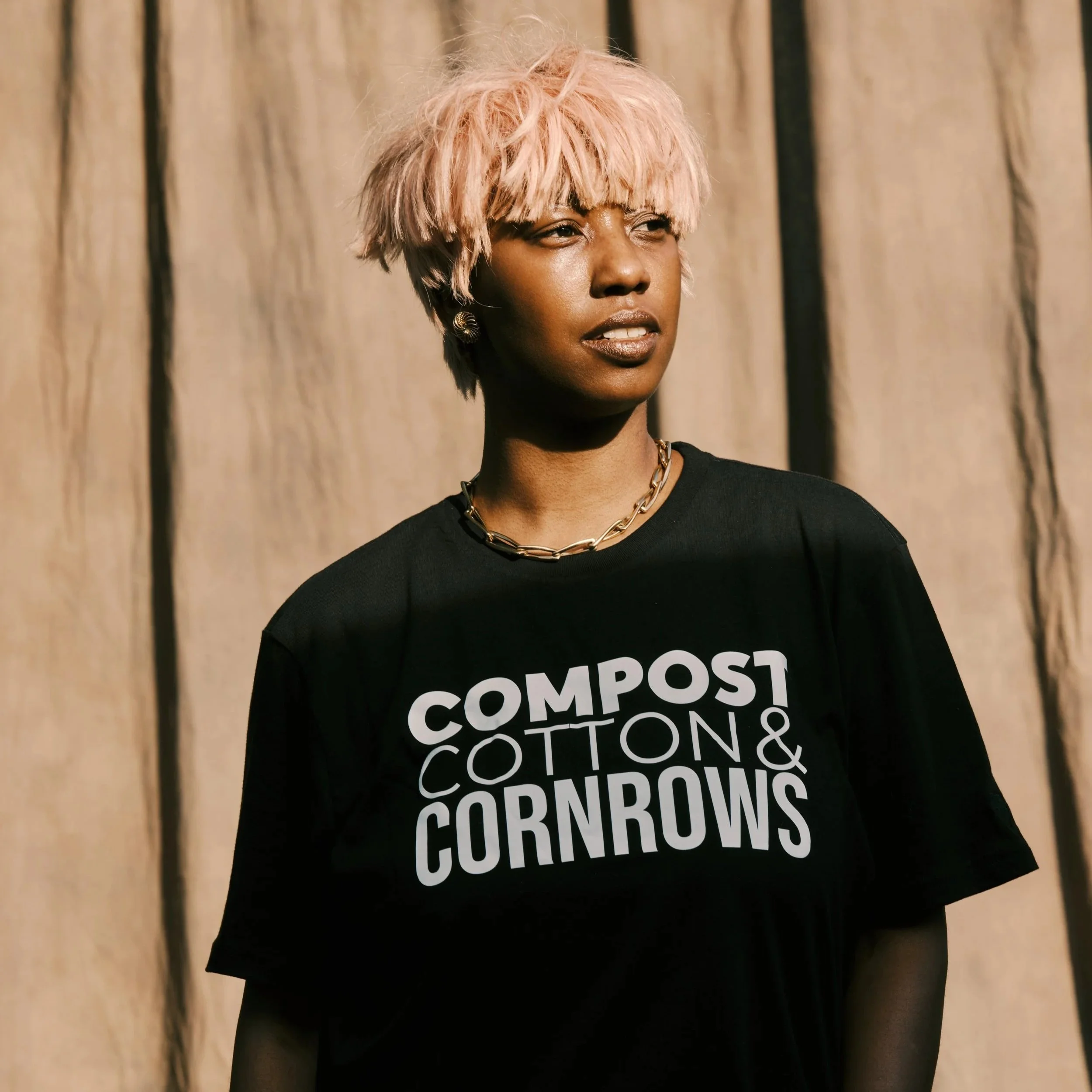MOVING STORIES THROUGH ART
Fall/Winter 2025
Dawn Richard and Dominique Drakeford on preserving culture and rewriting the narrative post-Katrina
St. Bernard Avenue, 7th Ward, New Orleans. Footwork, the style of dancing born out of the second line tradition. Anyone in the neighborhood is welcome in. Each Sunday from fall to early summer second liners strut along to the beat of the brass band all throughout the city. Photography by Brandon Holland.
The following conversation between environmental justice advocate Dominique Drakeford and beloved New Orleans artist Dawn Richard was first published on the 20th anniversary of Hurricane Katrina as part of the Compost, Cotton & Cornrows podcast. From reflecting on the hard work of intergenerational solidarity to the necessity of community storytelling, Dominique and Dawn uplift visions for a new New Orleans rooted in justice.
This conversation has been edited and condensed. You can watch the entirety of the interview here as well as listen on all mainstream platforms.
DOMINIQUE: My good sis Dawn…I like to set the tone with a definition. So I'm going to ask you, how do you define sustainability?
DAWN: I define sustainability with access to ancestral stories. The reason I say that is because…we are part of a culture that has understood sustainability long before the world told us what sustainability was….
The roots and the culture in which specifically I come from, in New Orleans, we preserve. That is what we are: a city of the preservation of culture, the preservation of reusing our soil, reusing our roots…reusing our materials to paint, to play, to move art through story. So we sustain every day.
“The roots and the culture in which specifically I come from, in New Orleans, we preserve. That is what we are: a city of the preservation of culture, the preservation of reusing our soil, reusing our roots.”
Claiborne Avenue, New Orleans. Social Aid & Pleasure Clubs are a network of black neighborhood organizations throughout New Orleans serving as culture bearers and community support. Photography by Brandon Holland.
DOMINIQUE: I know that’s right.
DAWN: And that is something that has been a part of our culture long before the word sustainability was even moved into a definition. And so when I think of sustainability, I think of ancestral roots and the stories behind our culture and how we cultivated it long ago.
DOMINIQUE: Moving stories through art. Come on, girl. I love that definition [of sustainability as a practice that is] rooted in ancestry.
There’s something that always needs to be said when we’re talking about the mainstream lexicon of sustainability. And when we're talking to Black folks [we need to] reaffirm that we've been about this life. It's been [re]packaged, right?...But it is literally part of our DNA. It’s ingrained in our blood circulation, in our bones, in the craft, in the culture, in the soil that we have worked. And so I love this definition, especially you being in New Orleans. So here for that. Thank you, sis….
So an artist of your caliber—and shout out to you for your artistry, your endless unwavering artistry—how did you walk that bridge into advocacy and environmental justice?
DAWN: …It chose me, I'll say that. Because I had to go through it to realize I needed to be a part of it. Specifically in New Orleans, knowledge and information is just not given…and parties that are not a part of environmental justice do a really good job of narrating the lie. They sell the lie to our communities in a way that keeps the wrong people in office, that keeps our infrastructures from not being sustainable enough to protect us….
Losing everything and living in a car and watching my family who built everything from nothing. My mom and dad worked… their asses off for my brother to have the education and the ability to move forward. And to watch it be stripped from them [in the aftermath of Katrina] and they not know what to do was the hardest thing I'd ever seen…..
“And parties that are not a part of environmental justice do a really good job of narrating the lie. They sell the lie to our communities in a way that keeps the wrong people in office, that keeps our infrastructures from not being sustainable enough to protect us.”
DAWN: I didn't necessarily know why we were in the situation, but I know what I felt. It wasn't until I saw us on CNN and I was given a red ticket from a “refugee” camp...and I'm saying refugee because that's how they treated us. Like they directed us to a tent, a Red Cross tent, and said, here's this red ticket. You'll get a box, a bag, a brown bag full of an apple, a sandwich and a cracker and pick out some underwear that was donated…and then here's a card for a thousand dollars. Good luck.
That was what we were given. [We were] treated that way and housed and moved into these sectional places because the hotels were too expensive or the hotels were sold out. And in that moment I realized, okay, this isn't just a storm. This is a genocide. This is [the government] trying to remove Black people for land, for money, for purposes other than [protecting citizens]....
Though I lost everything and got this career, the first thing on my mind was [how am I going to help?]...
I wanted to give back and I wanted to inform my people about the true reasons why we were in the situation that we were in and then continued to be in….[Because] what climate change is causing is affecting our communities first and foremost. And that became my pilgrimage. The day I was homeless [because of Katrina] was the pilgrimage.
Photography by Brandon Holland.
DOMINIQUE: I want to touch on Katrina for just a moment. And you let me know if you don't feel comfortable because it's one thing for folks on the outside who watched it through media, through books, to talk about it, to discuss and analyze. But for you who were in it and whose family was directly impacted—what does 20 years post Katrina, what does that feel like in your spirit and your soul?...
DAWN: I am comfortable talking about it because it needs to be talked about. So let me start there….
There are many levels to Katrina. There are things that we all know. For example; that climate change is real, right? A storm of that magnitude can only be affected by the reality that we are hurting our earth and that our earth is responding in kind.
The second part of that is the government knows. They know and can predict when these things are coming. And so infrastructure and representatives and councilmen and our leaders, our governors and mayors, should then have an understanding of the importance of a levee, the importance of infrastructure that is strong enough to sustain a place that is six feet below sea level. There's that part of it.
And then there is [the impact of the] LNG and petrochemical industry. Again, genocide. I have to say it. The plants that are affecting children and having asthma…[Louisiana] is one of the leading states for child cancer. We are riddled with cancer around our homes and our communities. That's why we have a place called Cancer Alley….
I think specifically because we are a Black city that is so popular and full of culture and so full of resilience and so full of power, there is a necessity to cultivate something and colonize it….it’s a kind of modern colonization, if you will, of stealing land, stealing homes, of stealing the things we have fought for.
“We have to, as a community, come together and lift our own selves and lift our own community, as Black people have been doing since the age of time.”
DAWN: So Katrina 20 is not just a commemoration or remembrance of a storm. It is an understanding [of the] importance of going back to those stories to tell our youth and people who have maybe not gone through Katrina, these young people who have not experienced that storm, to understand what we went through [and] what we are still going through. The through line of what that means, that it's not just a storm, but [that] our city and community is worth fighting for. We cannot rely on outer parties to cultivate our city. We have to, as a community, come together and lift our own selves and lift our own community, as Black people have been doing since the age of time.
DOMINIQUE: 100%. Too often colonization is talked about in the past, when it is active and it is hella present. And so I'm wondering, especially since you're bringing up the young folks who weren't a part of Katrina and maybe aren't privy to what y'all had to go through—do you think the knowledge of modern colonization is circulating in the education systems or even storytelling amongst elders to the young people? And do you have faith in the young people, especially the young Black and Brown kids in New Orleans? Do you have faith that they will be the warriors, the environmental warriors, for the next generation? Or do you think that there's a lot more work to be done so that they get it and can move the torch forward?
“Too often colonization is talked about in the past, when it is active and it is hella present.”
DAWN: I think both can be true. I have to believe that there will always be faith [because] the God I serve, that's what I believe in. That's number one. I am a woman of faith, so I have to believe that there is always hope in something. I do love what my youth are doing….
When I was working with the Hip Hop Caucus—I still am, as an artist consultant—in 2021, I think, we started talking about yo, why is the levee just sitting there bare? You know what I mean? Like every year we step with the amazing Sess 4-5—who is part of the Katrina Commemoration Inc.—he's been on the ground since year one after Katrina, advocating and pushing and striving for the community to come together to get eyes on the commemoration of Katrina, but also to make it a state holiday [a time where] everybody can reflect, pray, whatever they have to do, to address the trauma that is still hurting people today….
We were doing the commemoration and….the levees, it was just bare, grass not cut, the place where all this loss happened. [In the] 9th Ward, there were homes that had massive communities that now still look like swamp land…so the upkeep, the infrastructure, is just not there….
Lower Ninth Ward, New Orleans. In the years of recovery following the destruction of Hurricane Katrina, some neighborhoods have received decidedly less attention than others. Chief among them is the Lower 9th Ward, which remains underdeveloped and has seen an estimated 65% decrease in population compared to before the storm. Photography by Brandon Holland.
DAWN: So we were like, yo, it would be really great if we could paint the levees and make this place beautiful, remember this place for what it was. And the youth came through from the amazing Eternal Seeds from StudioBE team, and they painted it….
Things like that give me hope that these kids, though [they didn’t] experience Katrina, they still felt compelled to draw that story, to paint that story…Shout out to E. Buckles who did Katrina Babies and created an incredible film that talked about, okay, 20 years later, these kids who were babies in Katrina are still affected….
So you have the youth telling these stories, the amazing Tahj, Queen Tahj [who handcrafted the logo] for the Super Bowl [LIX], telling the story of New Orleans and the importance of the patch and the bead and the work and the feather. Tahj is a Gen Z-er, telling her story as a Mardi Gras Indian, as a queen that is re-seeing, re-innovating what the Mardi Gras Indian is in New Orleans, post- Katrina. All of these are youth in their ways doing it. So I have faith because I'm seeing my people put faith into action….
The rest of it is [that] I still feel that we could be doing more. And that's why I hope my youth continue to hold our council people, our government, to the fire. I want them to be mouthy. I want them to stand guard. I want them to talk on social media and go at it. Joke these people. You know what I mean? Hold them accountable….I want young people running for representatives….saying I feel compelled to wanna run because I don't really like the way my neighborhood is rocking. I wouldn't mind a gold tooth councilman, know what I mean? I wouldn't mind it because I think it's important for them to feel invigorated…
“Hold them accountable….I want young people running for representatives….saying I feel compelled to wanna run because I don’t really like the way my neighborhood is rocking.”
DOMINIQUE: There’s also that element of authenticity. If we want to have folks who can speak to culture, speak to the community, with the gold tooth, and be real, that’s what’s needed. We need that level of authenticity in these spaces unapologetically. And so I love that you're speaking truth to power in the young people.
DAWN: I have faith. I love my young people…I'm seeing it and they’re stepping up…so my ear is to them.
DOMINIQUE: Youth leaders are necessary. And I think there is an important conversation around intergenerational activism, right? We need our elders and our youth to be in the same spaces, fighting the same fight. Their voice may sound very different, their perspective a hell of a lot different, but if we're all fighting towards the same [goals] then we could figure out a way to commingle those existences and those experiences so that we are walking on the same pathway. I'm here for that.
“Because us as millennials, we’re able to bridge that gap in a special way that our elders or our young, our Gen Z, our youth cannot. We have a very special responsibility…to be able to be that voice who can speak both languages.”
DAWN: We have to let them be comfortable speaking in their language. Because…the way it's translated is the way it's translated. We get uncomfortable when it isn't received in a way which we want. But sometimes we have to hear that other language because that's how they're speaking with each other. And that's how the message can get through. That's [where] I feel like sometimes our climate advocacy misses the mark. We speak into the kettle and it's like we're the pot and it's going over people's heads, those terms, the way in which we're talking isn't translated into our people. That's why they don't know what a petrochemical is. That's why they don't really understand what climate change means. That's why they don't really understand LNG, or liquefied natural gas. We’re talking to them wrong, you know? And so like we gotta start speaking up.
DOMINIQUE: That's why it's important Dawn, because us as millennials, we're able to bridge that gap in a special way that our elders or our young, our Gen Z, our youth cannot. We have a very special responsibility…to be able to be that voice who can speak both languages….and it makes me wonder—and again, if I'm overstepping bounds, holla at me—but I want to know through this process, has it been challenging articulating or translating environmental justice language to your parents as elders?
DAWN: For sure…my parents are exceptional. Meaning they love me. And so after a while, my dad, it wasn't making sense. The way he was feeling…wasn’t adding up, you know?...My parents don't smoke, they don't drink, they’re very clean. Yet here we are, you know, in the cancer journey [with them]....
My parents wanted a beautiful home. They moved before my brother and I could really tell them the right place to go. And my mom and dad got into this beautiful home and all the things, but like, the smell [evidence of industry] is crazy.
….It took me a long time [to help them connect the dots]. Then I went and met with the amazing Miss Sharon Lavigne, and took the tour around St. James where they got like 20 plants, like back to back to back….
DOMINIQUE: Just spewing poison…
DAWN: It’s like what is happening right now? And I mean, it’s just insane. My mom [was] getting pneumonia, like getting a viral infection, every week. And I was like, mom, what is going on? …The slickness of it is that they'll say, it's a viral infection…when it's like, bro, it's the [pollution]....
But it took a year, almost two years for me to get here, for them to even think about the realities that maybe what's in their bodies, maybe the effect of what's going on is because of where they are.
And that's also hard, right? Because then you have parents who have worked their asses off. They lost everything [from Katrina only to] rebuild, to get here for somebody to tell them your choice was stupid or your choice makes you sick. Now what are they going to do?...
I've helped them and I've worked hard to do the best I can to help them. But also even if they [know they need to move] they don't want to move….
DOMINIQUE. Because they built a new foundation. It's hard. That's hard.
DAWN: And so no matter how much I'm like, mom, I'll buy you another [home] they're like, well, we picked [this home].... It's all these things…..Their mind is just in a different place.
So yeah, it has been difficult. [Just as] difficult [as it is] to translate [issues on environmental injustice] to [younger] artists and audiences…it's been difficult to translate [this issue] to faith goers and people. My parents are first-generation. My dad and mom drank from colored water fountains. You know what I'm saying? Like my dad remembers Ruby Bridges. He was young with her when they integrated. So my parents are parents of integration. I'm the first kid, my brother and I, out of...segregation. So that's a real thing. I'm just one generation.
DOMINIQUE: People think it's so far. People think colonization, Jim Crow, segregation [that it was a long time ago]. But it's not that far away.
“They strip away the narrative of who we are so that we don’t know our power. And it is an urgent time for us right now to understand who we are so that we can get out of this. Because if not, we’ll be wiped away.”
DAWN: [During Katrina 20 this August] I did an educational roundtable [with Miss Sharon Lavigne and her daughter Shamyra]. And Shamyra…she said it's genocide from birth to the plant, right?...The power plants, they come in [to high schools] and they say hey, come, we’ll teach you, this is a high paying job. [And Shamyra] was saying that six…young high schoolers came in and the [plant had] them cleaning the actual toxin tank. That was the job. They go in and actually clean the tank. She said the last of them died recently. So all six are dead. They died from cancer. But they get them young, you know. They have “career” fairs at high school and they come in and they're like, we got jobs for you.
DOMINIQUE: That is the most criminal thing.
DAWN: So then, they go and they work there and then they wind up with cancer. And now their family is riddled with it. They're living next to it because obviously they have to live close enough to work at the plant. Now their children have asthma and they're paying for those bills, right?...
[Shamyra] was saying, it's in the wombs. It starts in the wombs of women because they're breathing and drinking the water. So it's infested into the child before they’re even born…..
And I was just sitting there…and it just hit me that this [genocide] is real. Like that's the realest form that I could see. She just laid it out there. They're living it….Unfortunately the petrochemical side [has been so effective] that the work that needs to be done on our side to change and shift the narrative is imperative…
I do feel like Miss Sharon Lavigne [and her family are] holding her whole St. James [community] on their back and running. I do think Reverend Yearwood with the Hip Hop Caucus [is working hard to change the narrative] and we work with Beyond Petrochemicals to do that as well.
[The petrochemical industry] has a strategy. [And to challenge it, we have to] go back to our ancestral stories and understand what it means to sustain our power, our equity. Information is a part of that. Knowledge is a part of that. If we don't keep learning who we are, that's how they strip it. They strip away the narrative of who we are so that we don't know our power. And it is an urgent time for us right now to understand who we are so that we can get out of this. Because if not, we'll be wiped away.
How does the concept of peace & riot show up in your work?
The concept of peace and riot is literally the pulse of my podcast through storytelling and education. I bring guests on who bring fire, revolutionary vocal chords whose work centralizes resistance. And I also intentionally bring guests who focus on flow, healing and breathing deeply.
Like water and fire, peace and riot must coexist in order to dismantle harmful norms and build equitable ecosystems of care and culture. Symbolically, I don't see a separation of this idea of peace and rioting ... I interpret it as the necessary balance needed to beautifully bloom. My work focuses on cultural sustainability which is the soul of regeneration and necessitates the intersection of peace and riot.
— Dominique Drakeford
Dawn Richard is an American singer, songwriter, and visionary artist known for blending R&B, electronic, and experimental music. She gained fame as a member of the multi-platinum girl group Danity Kane before launching a bold solo career. Her critically acclaimed albums, like Goldenheart and Second Line, showcase her innovation and independence. Beyond music, Richard explores animation, tech, and visual art, carving out a unique space as a boundary-breaking, genre-defying creative force.
Dominique Drakeford is a home birth mother of two, cultural environmental strategist, writer, researcher and creative storyteller who has spent over 15 years reimagining sustainability and environmental justice. With a B.A. in Business Environmental Management from UCR and a Master’s in Sustainable Entrepreneurship & Fashion from NYU, she has led global lectures and workshops on decolonizing sustainable fashion, with features in over 30 major publications, including Vogue, Elle, and Vanity Fair. She is the host and executive director of the podcast Compost, Cotton & Cornrows - a space where Black vanguards redefine sustainability through storytelling, featuring conversations with Black and Afro-Indigenous experts across every industry and interest.
Peace & Riot is a nonprofit publication and free to read.
We believe access to movement-rooted storytelling should remain open and accessible.
But sustaining this publication requires sustained funding.
If you value independent storytelling that uplifts frontline voices, honors lived experience, and strengthens cultural resistance, please consider supporting our work with a tax-deductible donation.
Your contribution helps sustain the journalists, editors, artists, and storytellers who make this digital zine possible — and ensures Peace & Riot remains a platform for connection, truth, and creative expression.
Support Peace & Riot today.

